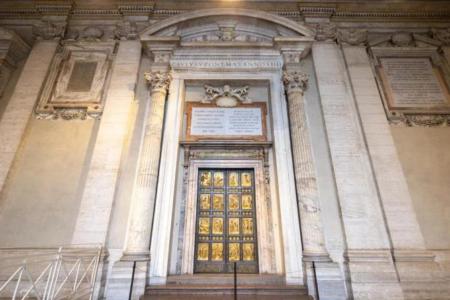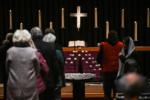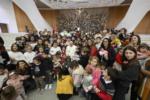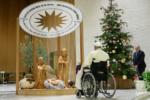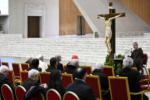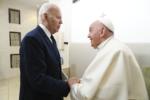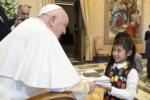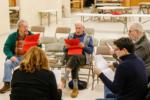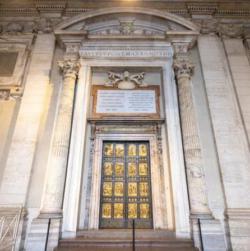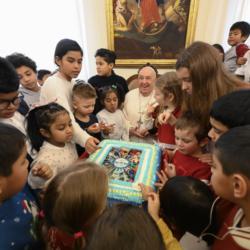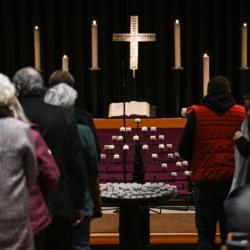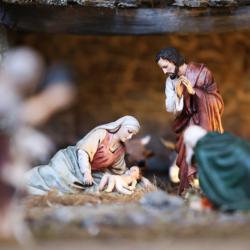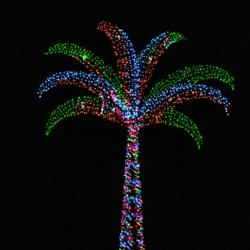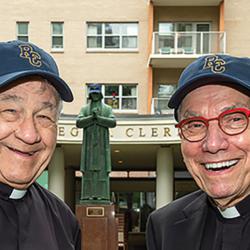Ten permanent deacons ordained
Deacon James Jerome Waldron
Deacon Richard Paul Vatcher
Deacon Timothy Daniel Sullivan
Deacon Walter Ernest Seamon
Deacon Daniel Edward O'Toole
Deacon Hugo Daniel Ochoa Rodriguez
Deacon Francisco Eliecer Mesa
Deacon Jason Camile Lampron
Deacon Daniel Lewis Cerys
Deacon David Scott Caouette
Deacon Rafael Bautista
BOSTON -- When he was young, Deacon Rafael Bautista lived a life of self-described "wildness" in his native Dominican Republic. But his youthful recklessness came to a head when he got into a life-threatening accident while riding his motorcycle. Looking back, he attributes his survival to divine intervention.
"For the grace of God, I'm here," said Deacon Bautista. "That made me turn my life around."
After his recovery, Bautista, the second of 10 children, came to America in search of a better life.
"We didn't have much," he remembered, "and that made me realize that life is not about what you have. It's about who you are, and what you want to become."
Deacon Bautista, of the Jamaica Plain-Roxbury Catholic Collaborative, felt the call to the permanent diaconate. On Sept. 9, the feast of St. Peter Claver, he and nine other men were ordained as permanent deacons by Cardinal Seán P. O'Malley at the Cathedral of the Holy Cross.
Deacon Bautista shared the honor with Deacons David S. Caouette of St. Patrick Parish in Stoneham; Daniel L. Cerys of St. Mary of the Annunciation Parish in Melrose; Jason C. Lampron of St. Mary Magdalen Parish in Tyngsborough; Francisco E. Mesa and Hugo D. Ochoa of St. Stephen Parish in Framingham; Daniel E. O'Toole of Mary Queen of Martyrs Parish in Plymouth; Walter E. Seamon of Our Lady of the Assumption Parish in Marshfield; Richard P. Vachter of Good Shepherd Parish in Wayland; and James J. Waldron of St. Francis of Assisi in Braintree. Timothy D. Sullivan, also of St. Francis of Assisi Parish in Braintree, was to be ordained with the deacon class, but could not attend due to illness.
In his homily, Cardinal O'Malley compared the diaconate to the Jewish concept of tikkun olam, which he described as an obligation to "repair the world, because it's a mess."
"The diaconate was created to do exactly that," he said. "It's still the job description for you men who are being ordained today: To repair the world and repair the Church."
The word deacon comes from the Greek word "diakonos," meaning servant. Deacons assist priests during Mass, proclaim the Gospel, and deliver homilies. They can also preside at baptisms, weddings, and rites of Christian burials.
Cardinal O'Malley called deacons "icons of Christ," "healers in a divided world," and "messengers of hope and mercy for those who are suffering."
The cardinal added that linguistic and ethnic differences should not cause division within the Church.
"The work of the deacon is to be healer," he said, "and reconciler, and a builder of community and solidarity amidst all of our differences."
Following the homily, each ordinand knelt before the cardinal, who asked them in their native language to make a promise of obedience to him and future archbishops.
The ordinands then lay prostrate on the floor facing the altar as the Litany of the Saints was sung.
Each man then approached the cardinal who laid his hands on their heads, ordaining them to the diaconate. The newly ordained were then vested with a stole and dalmatic, signs of the office of the deacon, and each received the Book of the Gospels from the cardinal.
Deacon Vatcher found his calling to the diaconate after a Cursillo in Framingham in 2004.
"It was my first time having a dialogue with Jesus," he said. "He called me to a journey of finding prayer and giving back."
Deacon Vatcher left his job as a senior corporate executive and took a lower-level position at a facility that manufactures vaccines, a job at which he felt he was serving the greater good. Sacrificing some of his material wealth and family time to follow his call to the diaconate was difficult. Ministering in prisons and hospitals, however, made it worth it.
"Initially, I felt very guilty," he said, "because I felt very happy after walking away from those experiences. But if you look at it, this is God's plan . . . He wants you to be happy doing those things."
"It's truly a moment of grace," said Deacon Lampron. "You can feel the presence of God's love flowing through each and every one of us."
Deacon Caouette, who was born with spina bifida, was especially humbled.
"People have had to do things for me my whole life," he said, "and I wanted to start giving back."
Twenty years of studying for the diaconate had strengthened his faith, even as he endured many surgeries and hospitalizations.
"God is in control," he said. "I know that he's with me; he's by my side every step of the way."
Most permanent deacons are married, and their wives and families share their ministerial journey.
Cardinal O'Malley praised the wives and children of the deacons for their "crucial role," providing a link between the religious and secular worlds.
"Without their support, I wouldn't be here today," Deacon Bautista said of his wife Paula and their four children. "I'd be nothing."
"It's been incredible," said Deacon Lampron's wife Stacy. "It's been a blessing. It's been a lot of prayer and worry and hard work."
When Deacon Lampron decided to become a deacon, his youngest daughter Olivia was four. Now, she's 14, and her faith has been strengthened by her father's example.
"It's become a big part of my life, but I support him no matter what," Olivia said. "It's shaped who I am."
After Mass, the new deacons gave blessings, took selfies, and celebrated with their families and friends.
"God has been calling me," said Deacon Rodriguez, who was born in Honduras and came to America in 1990. "I wasn't feeling worthy, but I listened to him."
Deacon Rodriguez's wife Argentina, their five children, and their five grandchildren were there to watch his ordination.
"I used to say, 'How am I going to know Christ?'" he said, "but then I learned that he's doing everything through other people."
